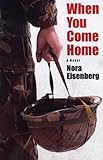 When You Come Home by Nora Eisenberg
When You Come Home by Nora EisenbergMy review
rating: 5 of 5 stars
Anthony Bravo and Lily Engels grew up together. When Lily was orphaned, Anthony's mother took her in and raised her as her own child. Both Anthony's father and Lily's father died as a result of the Vietnam War. When Anthony is sent to serve in the Gulf War, Lily realizes her feelings for Anthony are more romantic than brotherly. She confesses this to Anthony in a letter, and by the time he comes home from the Gulf War, he believes he feels the same way about Lily. The story begins as Anthony arrives home. He's exhausted and facing some big adjustments both in his personal and professional life. Lily now begins to pursue her dream of being married to and starting a family with Anthony.
Lily is the ultimate dreamer. She can picture and mentally map out the life she wants for herself and Tony, and no matter what problems introduce themselves into her long term plan, she works around them convinced she can still have her dream life.
Tony is more pragmatic, but then he has to be. He needs to find a job and there are suddenly roadblocks to the one he thought he'd have. There is a stressful time while Tony tries to straighten out a problem with his college credits; it is Lily who helps him fix the problem. At the same time as this crisis is unfolding and holding up Tony's efforts to get on with his life, he finds out that friends of his with whom he served in the Gulf War are getting sick. His friends' symptoms are all physical, but the VA doctors who treat the men blame the illness on psychological trauma. They are given antidepressants and sent home. Those most severely affected by the mysterious illness do not get better, and eventually after receiving the wrong treatment it becomes clearer and clearer that the problem is not psychological. It's physical, and it probably is the effect of something encountered in the Gulf War. In fact, the cause may be an agent released by the US military. Eventually some of the men are put on the right track to treatment, but there's no assurance that they will be cured, and for some, the treatment is too late in coming.
Nora Eisenberg has written an important book. While her characters may be fictional, the story they tell is not. We send our military into battle under the assumption they are protecting their country. But who is there when they come home, having been poisoned by God only knows what, to protect them? Why is our military being subjected to inadequate medical treatment at a time when they should be receiving the best, most advanced treatment we have to offer?
Some of the victims of the Gulf War were every bit as much victims of that encounter as those against whom we fought. We still do not have all the data necessary to evaluate how those who've served in Iraq fared. Reading When You Come Home made me more aware than ever that if we're going to ask a volunteer army to keep us safe, we should do our very best to afford them the same or at least address their medical problems with competence as quickly as possible.
View all my reviews.







No comments:
Post a Comment